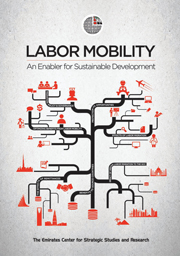Book contents
- Frontmatter
- Contents
- Figures and Tables
- Abbreviations and Acronyms
- Foreword
- Introduction
- 1 The Development Impacts of Temporary Migration and the Protection vs. Opportunities Trade-off
- 2 The Economic Development Benefits of Human Mobility to Source Countries
- 3 The Effects of Remittances
- 4 Recessions and Remittances in Home and Host Countries: An Overview
- 5 Seize the Spotlight: A Case for GCC Engagement in Research on the Effects of Labor Migration
- 6 Migration Policy and Governance in the GCC: A Regional Perspective
- 7 Optimizing benefits from Labor Mobility: The Case for Research Collaboration between Bangladesh and the GCC
- 8 Drivers of Development: The Impact of Indian Labor Migration to the GCC
- Contributors
- Notes
- Bibliography
- Index
Foreword
Published online by Cambridge University Press: 05 September 2014
- Frontmatter
- Contents
- Figures and Tables
- Abbreviations and Acronyms
- Foreword
- Introduction
- 1 The Development Impacts of Temporary Migration and the Protection vs. Opportunities Trade-off
- 2 The Economic Development Benefits of Human Mobility to Source Countries
- 3 The Effects of Remittances
- 4 Recessions and Remittances in Home and Host Countries: An Overview
- 5 Seize the Spotlight: A Case for GCC Engagement in Research on the Effects of Labor Migration
- 6 Migration Policy and Governance in the GCC: A Regional Perspective
- 7 Optimizing benefits from Labor Mobility: The Case for Research Collaboration between Bangladesh and the GCC
- 8 Drivers of Development: The Impact of Indian Labor Migration to the GCC
- Contributors
- Notes
- Bibliography
- Index
Summary
Labor mobility is particularly significant in the case of the GCC, which is host to around 15 million expatriate workers, generating US $80 billion in annual remittances and making the region the third largest source of remittances worldwide. Annually, the Gulf states provide around 1.5 million job opportunities, employing expatriate workers who in turn support an estimated 150 million dependents in their various home countries. However, little research has been conducted to identify and measure the impacts of this phenomenon on migrants' host countries or countries of origin.
In view of the importance of this issue to the Arab Gulf region and the world as a whole, and in keeping with the aim of the Emirates Center for Strategic Studies and Research (ECSSR) to inform the development of policies and strategies addressing contemporary challenges in this context, the Center hosted a conference under the title: Labor Mobility: Enabler for Sustainable Development in Abu Dhabi on May 14–15, 2013.
Held under the patronage of H.H. Sheikh Mansour Bin Zayed Al Nahyan, Deputy Prime Minister and Minister of Presidential Affairs, and jointly organized by the Ministry of Foreign Affairs, the Ministry of Labor, the ECSSR and the National Qualification Authority, the conference sought to motivate a higher level of participation by the GCC states in the global dialogue on migration and development, and to encourage greater engagement and cooperation among research institutions to generate more collaborative scholarship on this important issue.
- Type
- Chapter
- Information
- Labor MobilityAn Enabler for Sustainable Development, pp. xvii - xviiiPublisher: Emirates Center for Strategic Studies and ResearchPrint publication year: 2013



